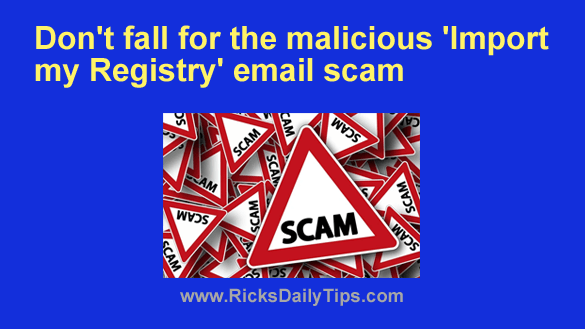 Rick’s Tech Tips Newsletter
Rick’s Tech Tips Newsletter
Email scams are certainly nothing new, and there’s one making the rounds via email once again that causes tons of heartache every time it rears its ugly head.
And unfortunately, this one will trash your PC’s Windows installation if you fall for it.
As usual, the wording of the scam varies a bit, but this seems to be the version that most people are receiving:
“Hey there! If your computer is running slow (and who’s aint these days) I’ve found an easy way to speed it up! My friend gave me a bunch of Registry changes that made my computer run a lot faster than it did before and I want to share it with you. Just click [this link] and download the Registry backup file that’s on it. Then use the instructions on the screen to import the file into your computer’s Registry. It’s easy. Do it now! You won’t regret it!“
If you receive an email like this, delete it immediately. And whatever you do, don’t click on the link in it!
Importing a Registry backup file that wasn’t created by that specific PC is very likely to render the machine unbootable even if the person that created the file had the best of intentions.
But trust me, the intentions of the people behind this scam are far from good. They’re out to cause you all kinds of grief.
Here’s why this scam is so dangerous:
Every Windows PC’s Registry database contains detailed information about the specific hardware, software and settings that are currently being used in that machine.
Even one tiny change to the Registry can cause serious issues with system performance and stability. In fact, it can even prevent the machine from booting up into Windows.
So you can imagine what importing an entire Registry backup file that was created on a machine that’s using completely different software and hardware would do to your PC.
You’d literally be changing the entire Registry database at once in ways that your system will never be able to sort out, resulting in a completely useless Windows installation.
Bottom line: If you receive an email similar to the one quoted above, delete it and ignore it.
If you’ve already received one and clicked the link in the email, I strongly suggest that you first delete the fraudulent Registry backup file if you downloaded it and then run a thorough series of malware scans on your system.
I also recommend that you always keep a recent backup of your hard drive or SSD on hand in case you happen to fall victim to a malicious scam like this. Trust me, you’ll need it.